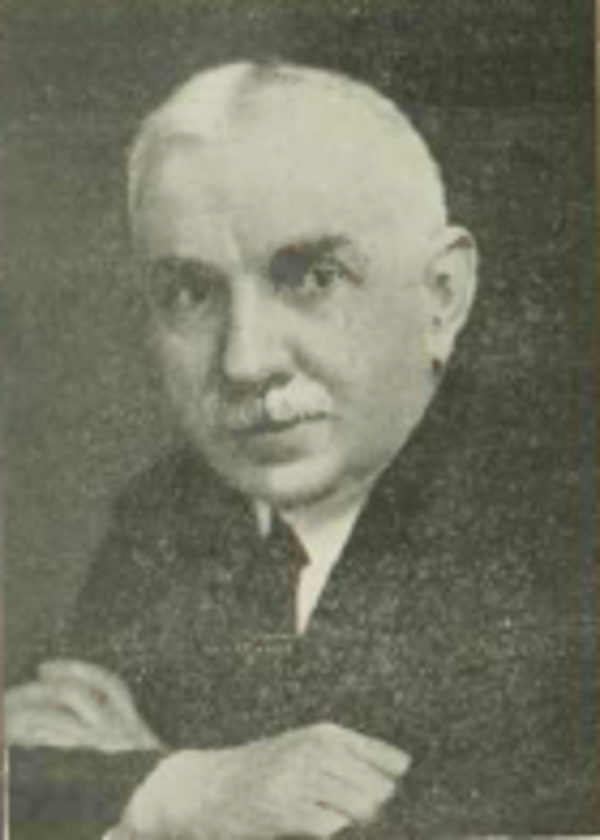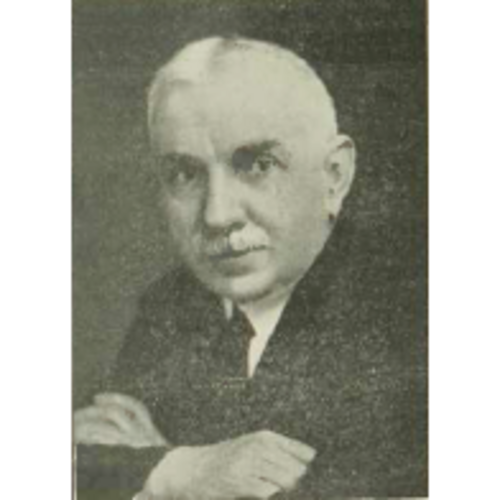
Source: Courtesy of Wikimedia Commons
McGRATH, Sir PATRICK THOMAS, journalist, office holder, author, and politician; b. 16 Dec. 1868 in St John’s, eldest son of William McGrath and Mary Bermingham; d. there unmarried 14 June 1929.
From birth, Patrick T. McGrath suffered from a nervous tremor, with one side of his body being partially paralysed. He was educated in St John’s by the Brothers of the Christian Schools of Ireland, leaving at the age of 14 to work as a clerk with T. McMurdo and Company, a firm of druggists. Because of his indifferent health P. T., as he was known, was drawn to outdoor employment, and in 1891 he began work as a reporter for the St John’s Evening Herald. In 1894 he would become Newfoundland correspondent for the London Times, and he would later write for other newspapers and magazines in England, Canada, and the United States.
In Newfoundland, success in journalism lay in alliances with local politicians, and McGrath was a skilful spokesman for those he supported. During the general election of 1893 he was interim editor of the Evening Herald, which backed the Tory opposition led by Moses Monroe* and Walter Baine Grieve*. He was appointed editor the next year. McGrath was a “fearless individual,” “scurrilous,” and “hated by many,” Peter John Cashin*, son of Sir Michael Patrick Cashin and a politician himself by the 1920s, would recall in 1967. McGrath was attacked physically on several occasions and at one point was apparently forced “to get a bodyguard with a license to carry a gun.”
Following a holiday in Canada in early 1895, McGrath wrote several articles in the Evening Herald favourable to the country and later in the year he actively promoted Newfoundland’s unsuccessful efforts to negotiate a political union with Canada. In the general election of 1897 he was instrumental in helping Conservative leader Sir James Spearman Winter* defeat Sir William Vallance Whiteway*. He was private secretary to Winter in 1898 when the latter attended the Anglo-American joint high commission at Quebec to discuss the Atlantic fisheries. His selection reflected not only partisanship, but also his knowledge of fishery disputes involving France, the United States, and Britain, about which he had written for several foreign magazines. In the early 1900s he would help the Newfoundland government prepare its case in similar conflicts with both France and the United States.
From 1897 to 1900 McGrath was assistant clerk of the House of Assembly. In the 1900 election he supported Liberal leader Robert Bond and, after Bond became premier, he was appointed clerk of the house in 1901. When St John’s West mha Edward Patrick Morris* split with Bond six years later and formed the People’s party, McGrath left the Evening Herald and launched the Evening Chronicle to support him. In the election of 1908, which ended in a tie, he acted as chief propagandist for Morris, and he did so again in 1909 when Morris won a clear victory. He retained his position as clerk of the assembly until his appointment in 1912 to the Legislative Council. As a councillor, he proved an able and knowledgeable debater. He placed his talents at the disposal of the administrations he supported and was often asked to prepare budget speeches. He became president of the council in 1915.
In 1911 he had published in London Newfoundland in 1911 . . . , an optimistic review of political, social, and economic conditions on the island. The book praised the policies of the Morris government and the business practices of William Duff Reid and his brothers, the owners of the Newfoundland Railway and the holders of large land, timber, and mineral concessions in the colony. The following year McGrath’s Chronicle Publishing Company purchased the Evening Herald and he merged the Chronicle with it. He became president of the new company and editor of the Herald. In 1913 the Morris government won re-election, but faced a stronger opposition in a coalition of Liberals and Unionists, the latter being followers of William Ford Coaker*, who had founded the Fishermen’s Protective Union in 1908. From 1912 until he left the Herald in 1920 McGrath was one of Coaker’s harshest critics.
During Morris’s absences from Newfoundland on government business, McGrath kept him apprised of events in the colony. His letters, particularly for the years 1911 to 1914, are valuable for their comments on local political and social life. During World War I McGrath was honorary secretary of the Newfoundland Patriotic Fund and finance secretary of the Newfoundland Regiment. He helped to organize the Board of Pension Commissioners for Newfoundland, which administered war pensions, and served as its first chairman. In 1917 he presided over the government commission which investigated the high cost of living, and he became chair of the Food Control Board that was subsequently established. A supporter of conscription in 1918, he received a knighthood that year for his contributions to the war effort. He found the cynical local response to this honour disheartening. “But one has to be big enough to disregard these ‘flea-bites,’” he wrote to a friend.
In the 1919 general election McGrath supported the Liberal-Progressive party headed by Sir Michael Cashin, which lost to an alliance of Liberals led by Richard Anderson Squires* and Unionists under Coaker. With the change in government, he resigned the presidency of the Legislative Council. In 1920 Prime Minister Squires, recognizing McGrath’s historical knowledge and skills, offered him the task of researching Newfoundland’s claim in its dispute with Canada over the ownership of Labrador. After consulting with Cashin, McGrath resigned from the Evening Herald (which ceased publication later in the year) to undertake this work. His extensive investigations in British, Canadian, and American archives played a key role in forming the legal case which resulted in 1927 in a decision in Newfoundland’s favour by the Judicial Committee of the Privy Council in Britain.
From 1925 until his death McGrath again served as president of the Legislative Council. He occasionally represented Newfoundland at international conferences as well, but he was mainly occupied in giving public lectures and writing articles on the boundary dispute and on confederation. He had been a lifelong confederate but had kept his views on the subject muted during the heyday of his journalistic career after 1895.
Centre for Newfoundland Studies, Memorial Univ. of Nfld, Arch. (St John’s), coll-175 (P. T. McGrath papers), McGrath to E. P. Morris, 13, 20, 28 June, 4, 13 July 1911; McGrath to J. E. J. Fox, 8 April 1918. “Articles by Sir P. T. McGrath,” comp. Melvin Baker (photocopy, [St John’s, 1973]; copy in Centre for Newfoundland Studies). Melvin Baker, “Prominent figures from our recent past: Patrick Thomas McGrath, [1868–1928],” Newfoundland Quarterly (St John’s), 87 (1992–93), no.4: 37–38 (text also available on the author’s website: www.ucs.mun.ca/~melbaker/); “Sir Patrick Thomas McGrath: a brief bibliography of his writings” (typescript, [St John’s, 1974]; copy in Centre for Newfoundland Studies). P. [J.] Cashin, “Sir Patrick McGrath, a biography” (Canadian Broadcasting Corporation radio broadcast, St John’s, 1967; transcript in Centre for Newfoundland Studies). I. D. H. McDonald, “To each his own”: William Coaker and the Fishermen’s Protective Union in Newfoundland politics, 1908–1925, ed. J. K. Hiller (St John’s, 1987). Newfoundland Quarterly, 29 (1929–30), no.1: 16. B. J. Pippy, “Sir Patrick McGrath: a biographical essay” (ba thesis, Memorial Univ. of Nfld, 1992).
Cite This Article
Melvin Baker, “McGRATH, Sir PATRICK THOMAS,” in Dictionary of Canadian Biography, vol. 15, University of Toronto/Université Laval, 2003–, accessed April 3, 2025, https://www.biographi.ca/en/bio/mcgrath_patrick_thomas_15E.html.
The citation above shows the format for footnotes and endnotes according to the Chicago manual of style (16th edition). Information to be used in other citation formats:
| Permalink: | https://www.biographi.ca/en/bio/mcgrath_patrick_thomas_15E.html |
| Author of Article: | Melvin Baker |
| Title of Article: | McGRATH, Sir PATRICK THOMAS |
| Publication Name: | Dictionary of Canadian Biography, vol. 15 |
| Publisher: | University of Toronto/Université Laval |
| Year of publication: | 2005 |
| Year of revision: | 2013 |
| Access Date: | April 3, 2025 |



